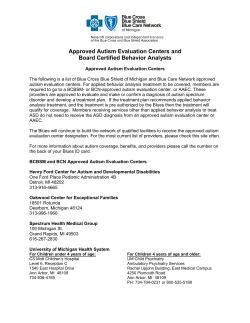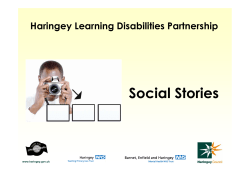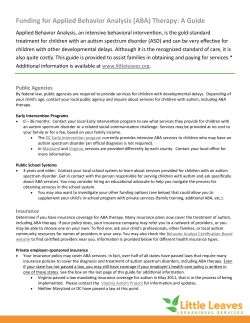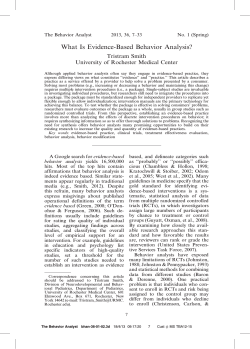
Medical Necessity Guidelines: ABA (Applied Behavioral Analysis) Therapy
Medical Necessity Guidelines: ABA (Applied Behavioral Analysis) Therapy and Habilitative Services for Autism Spectrum Disorders – MA Products Effective: March 12, 2014 Clinical Documentation and Prior Authorization Required Not Covered √ Type of Review – Care Management Type of Review – Mental Health Fax: 617-673-0314 Administrative Process (internal use only) √ MD/LICSW/ LMHC/PhD/RN Note: While you may not be the provider responsible for obtaining prior authorization, as a condition of payment you will need to make sure that prior authorization has been obtained. OVERVIEW Tufts Health Plan provides coverage for medically necessary Applied Behavioral Analysis (ABA) Therapy and habilitative services for members with a definitive diagnosis of an Autism Spectrum Disorder. Applied Behavioral Analysis (ABA) includes the “design, implementation and evaluation of environmental modifications, using behavioral stimuli and consequences, to produce socially significant improvement in human behavior, including the use of direct observation, measurement and functional analysis of the relationship between environment and behavior.”1 "Involvement by parents [legal guardians] is considered essential to long-term treatment success; parents [legal guardians] are taught to continue behavioral modification training.”2 Habilitative care is provided by licensed health care professionals and is “necessary to develop, maintain and restore, to the maximum extent practicable, the functioning of an individual”3 diagnosed with an Autism Spectrum Disorder. Coverage is provided consistent with Chapter 207 of the Acts of 2010 - An Act Relative to Insurance Coverage for Autism in the state of Massachusetts. COVERAGE GUIDELINES Tufts Health Plan may authorize ABA therapy visits and/or habilitative care visits after a comprehensive evaluation and with a referral (as needed) when all of the following are met: 1. The Member has a definitive diagnosis of an Autism Spectrum Disorder from a Neurologist, Pediatric Neurologist, Developmental Pediatrician, Psychologist, Psychiatrist or other licensed physician experienced in the diagnosis and treatment of autism; and 2. The diagnostic evaluation includes, without limitation, behavioral and cognitive evaluation, prenatal (if known) and perinatal history, developmental history and medical screening for comorbid medical issues; and 3. From initial evaluation through the entire course of treatment, all of the following must be met and documented in the rendering provider’s medical record: a) Contemporaneous progress notes signed by the rendering provider must include the procedure, participants, setting, content of therapeutic intervention, time and date of each session; and b) Documentation must support the position that therapy will achieve functional gains beyond those expected as a result of growth and maturation and there is clear evidence that the symptoms of the diagnosis are active, resulting in substantial impairment in daily functioning; and c) Communication with the member’s PCP and other treating professionals should be reflected in the medical record; and d) There is a clear treatment plan with measurable goals that address the signs and symptoms of the diagnosis; and e) There is no less intensive or more appropriate level of services which can be safely and effectively provided; and f) The services are not duplicative of services that are part of an Individual Educational Plan (IEP) or Individual Service Plan (ISP) when applicable; and g) The Member’s condition can be classified with at least one of the diagnosis codes listed below; and h) Parent(s) and/or Guardian(s) involvement in the training of behavioral techniques must be documented in the member’s medical record and is critical to the generalization of treatment goals to the member’s environment. i) ABA services are provided by a Board Certified Behavior Analyst (BCBA) or paraprofessional (H2019) supervised by a BCBA and are billed with the procedure codes listed below. 2161189 1 Medical Necessity Guidelines: ABA (Applied Behavioral Analysis) Therapy and Habilitative Services for Autism Spectrum Disorders j) Habilitative services, including group treatment, are provided by a licensed health care provider providing services within the scope of his/her professional license and are billed with standard billing codes. ABA Autism Service Request– Assessment & Treatment Planning (H0031 code) Initial Autism Service Request LIMITATIONS The following do not meet the medical necessity guidelines, and therefore coverage will not be authorized: Therapy when measurable functional improvement is not expected or progress has plateaued. Services that are primarily educational in nature Services encountered in school settings (e.g., psychosocial speech delay, behavioral problems, attention disorders, conceptual handicap, mental retardation, developmental delays). “Services related to autism spectrum disorder provided by school personnel pursuant to an individual education program are not subject to reimbursement” 4 Services that are not medically necessary Treatment whose purpose is vocationally or recreationally based. Treatment that is investigational or unproven, including, but not limited to facilitated communication, Auditory Integration Therapy (AIT), Holding Therapy, Higashi (Daily Life Therapy). Services that are provided for developmental purposes. For the purposes of this guideline, the term developmental is defined as a delay in the expected achievement of age-appropriate fine motor, gross motor, social, or language milestone that are not caused by an underlying medical illness or condition. Cognitive Therapy or retraining. Personal training or life coaching. Custodial care, which for the purposes of this guideline is defined as care that is provided primarily to assist in the activities of daily living, such as bathing, dressing, eating, and maintaining personal hygiene and safety; is provided primarily for maintaining the Member’s or anyone else’s safety; and could be provided by people without professional skills or training. Any service, program, supply, or procedure performed in a non-conventional setting (This includes, but is not limited to, spas/resorts; educational, vocational, or recreational settings; daycare or preschool settings; Outward Bound; or wilderness, camp or ranch programs). This is the case even if the services are performed by a licensed provider (including, but not limited to, mental health professionals, nutritionists, nurses or physicians). CODES The member must have one of the following ICD-9 diagnoses to be considered for coverage. Refer to the Autism Professional Payment Policy for information regarding billing of these services. Table 1: ICD-9 Codes ICD-9 Code Description 299.00 Autistic disorder, current or active state 299.10 Childhood disintegrative disorder, current or active state 299.80 Other specified pervasive developmental disorders, current or active state 299.90 Unspecified pervasive developmental disorder, current or active state The member must have one of the following ICD-10 diagnoses to be considered for coverage. Note: The following ICD-10 diagnosis codes are effective on or after October 1, 2015. Table 2: ICD-10 Codes ICD-10 Code Description F84.0 Autistic disorder F84.3 Other childhood disintegrative disorder F84.5 Asperger's syndrome F84.8 Other pervasive developmental disorders F84.9 Pervasive developmental disorder, unspecified 2 Medical Necessity Guidelines: ABA (Applied Behavioral Analysis) Therapy and Habilitative Services for Autism Spectrum Disorders One of the following HCPCS codes needs to be submitted with one of the above diagnosis codes to be considered for coverage: Table 3: HCPCS Codes HCPCS Code Description H0031 Mental health assessment, by non-physician - Assessment and treatment planning by a BCBA Mental health service plan development by non-physician - Direct supervision of a paraprofessional by H0032 a BCBA H2012 Behavioral health day treatment, per hour - Direct service by a BCBA H2019 Therapeutic behavioral services, per 15 minutes - Paraprofessional direct service supervised by a BCBA REFERENCES Massachusetts Session Laws, Chapter 207 of the Acts of 2010 – An Act Relative to Insurance Coverage for Autism (effective January 1, 2011) 1. Chapter 207 of the Acts of 2010 - An Act Relative to Insurance Coverage for Autism 2. Geller, 1972; Lovaas, 1987; Smith et al, 2000; Butler et al., 2003; Shea, 2004 quoted in Hayes, Inc., Intensive Behavioral Intervention Therapy for Autism., 2012; page 7 3. Chapter 207 of the Acts of 2010 - An Act Relative to Insurance Coverage for Autism 4. Chapter 207 of the Acts of 2010 - An Act Relative to Insurance Coverage for Autism APPROVAL HISTORY December 2010: Reviewed and Approved by Medical Affairs-Medical Policy for a January 1, 2011 effective date. Subsequent endorsement date(s) and changes made: August 8, 2011: Reviewed and revised. Added clarification language; “d) The services are not duplicative of service that are part of an Individual Educational Plan (IEP) or Individual Service Plan (ISP)” and removed bullet #3 of Coverage Guidelines. January 1, 2013: Reviewed and revised. Additional clarification added to guidelines, including: Added to Guideline #1: “other licensed physician”; Added clarification to Guideline #2: “The diagnostic evaluation includes, without limitation, behavioral and cognitive evaluation, prenatal (if known) and perinatal history, developmental history and medical screening for comorbid medical issues.”; Added clarification to Guideline #3(g): “ABA services are provided by a Board Certified Behavior Analyst (BCBA) or paraprofessional (H2019) supervised by a BCBA and are billed with the procedure codes listed below. Habilitative services, including group treatment, are provided by a licensed health care provider providing services within the scope of his/her professional license and are billed with standard billing codes.” February 18, 2013: Added ICD-10 Codes July 10, 2013: Reviewed and Approved by Integrated Medical Policy Advisory Committee March 12, 2014: Reviewed, revised and Approved by Integrated Medical Policy Advisory Committee. Revised 3.h. from requiring parents to be present and participating in all treatment sessions to “Parent(s) and/or Guardian(s) involvement in the training of behavioral techniques must be documented in the member’s medical record and is critical to the generalization of treatment goals to the member’s environment”. Revised guideline 3. i. and separated it out to 3. i and 3.j.. Revised last bullet under limitations to further define “non-conventional setting”. BACKGROUND, PRODUCT AND DISCLAIMER INFORMATION Medical Necessity Guidelines are developed to determine coverage for Tufts Health Plan benefits, and are published to provide a better understanding of the basis upon which coverage decisions are made. Tufts Health Plan makes coverage decisions using these guidelines, along with the Member’s benefit document, and in coordination with the Member’s physician(s) on a case-by-case basis considering the individual Member's health care needs. Medical Necessity Guidelines are developed for selected therapeutic or diagnostic services found to be safe, but proven effective in a limited, defined population of patients or clinical circumstances. They include concise clinical coverage criteria based on current literature review, consultation with practicing physicians in the Tufts Health Plan service area who are medical experts in the particular field, FDA and other government agency policies, and standards adopted by national accreditation organizations. Tufts Health Plan revises and updates Medical Necessity Guidelines annually, or more frequently if new evidence becomes available that suggests needed revisions. Medical Necessity Guidelines apply to all fully insured Tufts Health Plan products unless otherwise noted in this guideline or the Member’s benefit document. This guideline does not apply to Tufts Health Plan Medicare Preferred or to certain 3 Medical Necessity Guidelines: ABA (Applied Behavioral Analysis) Therapy and Habilitative Services for Autism Spectrum Disorders delegated service arrangements. For self-insured plans, coverage may vary depending on the terms of the benefit document. If a discrepancy exists between a Medical Necessity Guideline and a self-insured Member’s benefit document, the provisions of the benefit document will govern. Applicable state or federal mandates will take precedence. Providers in the New Hampshire service area are subject to Cigna’s provider agreements with respect to CareLinkSM members. Treating providers are solely responsible for the medical advice and treatment of Members. The use of this guideline is not a guarantee of payment or a final prediction of how specific claim(s) will be adjudicated. Claims payment is subject to eligibility and benefits on the date of service, coordination of benefits, referral/authorization, utilization management guidelines when applicable, and adherence to plan policies, plan procedures, and claims editing logic. Provider Services 4 Medical Necessity Guidelines: ABA (Applied Behavioral Analysis) Therapy and Habilitative Services for Autism Spectrum Disorders
© Copyright 2025
















